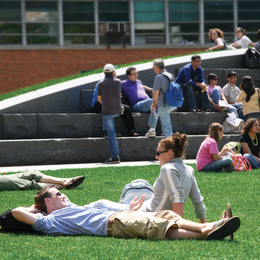
Although the college years are supposed to be a time of exploration and discovery, they can also be the most stressful period in a young adult’s life. Besides being on their own for the first time in what is usually an unfamiliar environment, students must also endure the pressures of a challenging course load, fulfill a raft of extracurricular obligations and, in a sense, figure out what to do with the rest of their lives.
In addition, depending on the campus, students face multiple distractions and temptations. Although illegal drugs, alcohol and other vices have existed for generations, current students live in a different environment compared with the one in which their parents went to college, according to John Duffy, a clinical psychologist, life coach and author of the book, “The Available Parent.”
“The culture has changed quite a bit by degree,” he says. “There is a lot of binge drinking on campus to the point of blackout, for both boys and girls. Also, perhaps there were pot smokers a generation ago, but [marijuana] is more potent today.”
Whether it’s the result of the temptation to partake in illicit substances or simply the pressures of performing academically, the stresses and strains of college life can take a heavy toll. A 2012 study by the American College Counseling Association found that 37.4 percent of college students who sought help had severe psychological problems, up from just 16 percent in 2000. Duffy’s best advice: Before students set foot on campus, parents should talk to their children about the environment they will face.
“I use the word ‘availability’ a lot, and I think it is the key for parents,” he says. “Parents can state their feelings while continuing to make themselves available to their children as guides and consultants. But in order to do so, parents need to keep the door open to hearing things that will likely make them uncomfortable. … This is a critical consideration for parents. Not knowing does not mean your kids are safe.
“It is so tough to relate that I encourage parents to ask their children, other college students and other parents to gain an understanding of the shifting culture on campuses,” he continues. “The more you ask, the more you’ll understand.”


